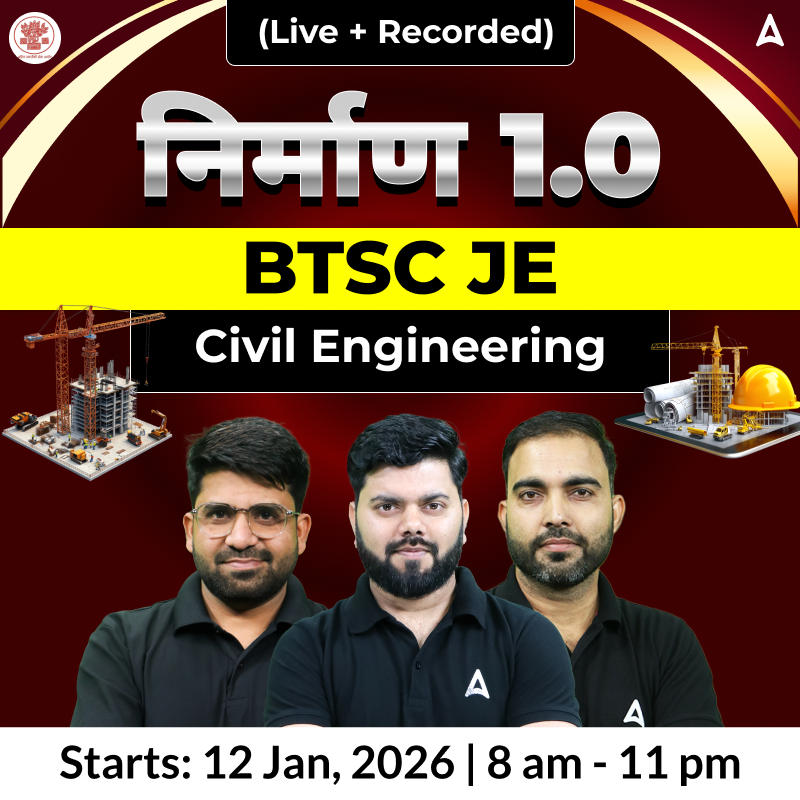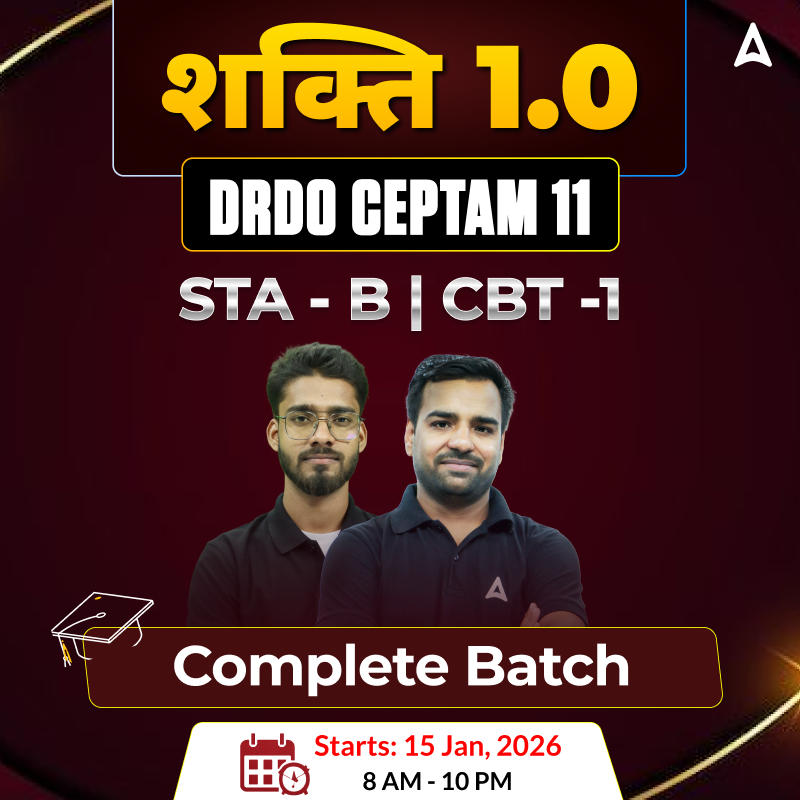Table of Contents
The Railway Recruitment Board (RRB) has released the official syllabus for the 2569 Junior Engineer posts on its website. Candidates preparing for the exam can now start their studies with the updated RRB JE Civil Syllabus 2026. This article provides comprehensive details about the RRB JE Exam 2026, including the complete syllabus and exam pattern for the written test. Aspirants are advised to read the article carefully and bookmark this page for the latest updates on engineering job opportunities.
RRB JE Civil Syllabus 2026
The RRB JE Exam 2026 will be held on 19th February, 20th February & 25th February 2026, and it is very important for candidates to clearly understand the RRB JE Civil Syllabus and exam pattern for better preparation. When aspirants know the subjects and structure of the exam in advance, it becomes easier to make a proper study plan that matches the exam’s needs. To help you with this, we have explained the RRB JE Civil Syllabus and Exam Pattern in detail in this article, so you can start your preparation smoothly and without any confusion.
RRB JE 2026 Civil Syllabus -Overview
We have provided a basic overview of the RRB JE Civil Syllabus and exam pattern 2026 in a tabulated manner for the ease of the candidates.
| RRB JE Civil Syllabus 2026 |
|
| Organization | Railway Recruitment Board |
| Name of the Examination | RRB Junior Engineer Exam |
| Name of the Posts | Junior Engineer, Depot Materials Superintendent, Chemical & Metallurgical Assistant |
| RRB JE 2026 Exam | 19th February, 20th February & 25th February 2026 |
| Exam Type Level | All India Level |
| Selection Process | RRB JE CBT-I, RRB JE CBT-II, Document Verification, and Medical Examination |
RRB JE Exam Pattern 2026
The candidates aiming to crack the RRB JE Exam must be well-versed with the exam pattern to get familiar with the scheme of the question paper. The RRB JE Exam Pattern 2026 is given below as prescribed under the official RRB JE notification PDF. Candidates must refer to the Railway Recruitment Board Exam Pattern:
RRB JE CBT 1 Exam Pattern 2026
- The questions will be bilingual, i.e., English and Hindi
- The question paper will comprise questions in multiple-choice questions (MCQ).
- The CBT 1 Exam has a maximum of 100 marks.
- The time duration for the Railway Recruitment Board paper will be 90 minutes.
- There will be a 1/3 negative marking in the Railway Recruitment Board CBT 1 Test.
|
RRB JE CBT 1 Exam Pattern 2026
|
|||
|
Subject
|
Number of Questions
|
Marks
|
Duration
|
|
Mathematics
|
30
|
30
|
90 mins
|
|
General Awareness & Reasoning
|
25
|
25
|
|
|
General Awareness
|
15
|
15
|
|
|
General Science
|
30
|
30
|
|
|
Total
|
100
|
100
|
|
RRB JE CBT 2 Exam Pattern 2026
- The questions will be bilingual, i.e., English and Hindi
- The question paper will comprise questions in multiple-choice questions (MCQ).
- The CBT 2 Exam has a maximum of 150 marks.
- The time duration for the Railway Recruitment Board paper will be 120 minutes.
- There will be a 1/3 negative marking in the Railway Recruitment Board CBT 2 Test.
|
RRB JE CBT 2 Exam Pattern 2026
|
|||
|
Exam Name
|
Subjects
|
Marks
|
Time Duration
|
|
RRB CBT-2
|
General Awareness
|
15
|
120 Minutes
|
|
Physics & Chemistry
|
15
|
||
|
Basics of Computer Applications
|
10
|
||
|
Basics of Environmental & Pollution
|
10
|
||
|
Technical Discipline
|
100
|
||
|
Total
|
150 Marks
|
||
RRB JE Civil Engineering Syllabus 2026 Detailed
Here are the main topics included in the RRB JE Syllabus 2026. For candidates from Civil Engineering, Paper 2 will have questions only from this syllabus. The detailed syllabus is given below:
| Name of Subjects | Name of Topics |
| Engineering Mechanics | Force (resolution of force, moment of force, force system, composition of forces), Equilibrium, Friction, Centroid and Center of gravity, Simple machines. |
| Engineering Mechanics | Building components (substructure, superstructure), type of structure (load bearing, framed, and composite structures). |
| Building materials | Masonry materials (stones, bricks, and mortars), Timber, and miscellaneous materials (glass, plastic, fiber, aluminum steel, galvanized iron, bitumen, PVC, CPVC, and PPF). |
| Construction of substructure | job layout, earthwork, foundation (types, dewatering, coffer dams, bearing capacity). |
| Construction of the superstructure | stone masonry, brick masonry, Hollow concrete block masonry, composite masonry, cavity wall, doors and windows, vertical communication (stairs, lifts, escalators), scaffolding, and shoring. |
| Building finishes | Floors (finishes, process of laying), walls (plastering, pointing, painting), and roofs (roofing materials including RCC). |
| Building maintenance | Cracks (causes, type, repairs- grouting, uniting, epoxy, etc.), settlement (causes and remedial measures), and re-baring techniques. |
| Building Drawing | Conventions (type of lines, symbols), planning of building (principles of planning for residential and public buildings, rules and byelaws), drawings (plan, elevation, section, site plan, location plan, foundation plan, working drawing), perspective drawing. |
| Concrete Technology | Properties of various types/grades of cement, properties of coarse and fine aggregates, properties of concrete (water-cement ratio, properties of fresh and hardened concrete), Concrete mix design, testing of concrete, quality control of concrete (batching, formwork, |
| Surveying | Types of survey, chain and cross staff survey (principle, ranging, triangulation, chaining, errors, finding area), compass survey (principle, bearing of line, prismatic compass, traversing, local attraction, calculation of bearings, angles, and local attraction) leveling (dumpy level, recording in level book, temporary adjustment, methods of reduction of levels, classification of leveling, tilting level, auto level, sources of errors, precautions and difficulties in leveling), contouring (contour interval, characteristics, method of locating, interpolation, establishing grade contours, uses of contour maps), area and volume measurements, plane table survey (principles, setting, method), theodolite survey (components, adjustments, measurements, traversing), Tacheometric survey, curves (types, setting out), advanced survey equipment, aerial survey and remote sensing. |
| Computer-Aided Design | CAD Software (AutoCAD, Auto Civil, 3D Max, etc.), CAD commands, generation of the plan, elevation, section, site plan, area statement, and 3D view. |
| Geo-Technical Engineering | Application of Geo-Technical Engineering in the design of foundations, pavements, earth retaining structures, earthen dams, etc., physical properties of soil, permeability of soil and seepage analysis, shear strength of soil, bearing capacity of soil, compaction and stabilization of soil, site investigation, and subsoil exploration. |
| Hydraulics | properties of fluid, hydrostatic pressure, measurement of liquid pressure in pipes, fundamentals of fluid flow, flow of liquid through pipes, flow through open channels, flow measuring devices, and hydraulic machines. |
| Irrigation Engineering | Hydrology, investigation and reservoir planning, percolation tanks, diversion head works. |
| Mechanics of Structures | Stress and strain, shear force and bending moment, moment of inertia, stresses in beams, analysis of trusses, strain energy. |
| Theory of structures | Direct and bending stresses, slope and deflection, fixed beam, continuous beam, moment distribution method, columns. |
| Design of Concrete Structures | Working Stress method, Limit State method, analysis, and design of singly reinforced and doubly reinforced sections, shear, bond, and development length, analysis and design of T Beam, slab, axially loaded column, and footings. |
| Design of Steel Structures | Types of sections, grades of steel, strength characteristics, IS Code, Connections, Design of tension and compression members, steel roof truss, beams, and column bases. |
| Transportation Engineering | Railway Engineering (alignment and gauges, permanent way, railway track geometrics, branching of tracks, stations and yards, track maintenance), Bridge engineering (site selection, investigation, parts of bridge, permanent and temporary bridges, inspection and maintenance), Tunnel engineering (classification, shape and sizes, tunnel investigation and surveying, method of tunneling in various strata, precautions, equipment, explosives, lining, and ventilation). |
| Highway Engineering | Road Engineering, investigation for road projects, geometric design of highways, construction of road pavements and materials, traffic engineering, hill roads, drainage of roads, maintenance and repair of roads. |
| Environmental Engineering | Environmental pollution and control, public water supply, domestic sewage, solid waste management, environmental sanitation, and plumbing. |
| Advanced Construction Techniques and Equipment | Fibers and plastics, artificial timber, advanced concreting methods (underwater concreting, ready mix concrete, tremix concreting, special concretes), formwork, pre-fabricated construction, soil reinforcing techniques, hoisting and conveying equipment, earth moving machinery (exaction and compaction equipment), concrete mixers, stone crushers, pile driving equipment, working of hot mix bitumen plant, bitumen paver, floor polishing machines. |
| Estimating and Costing | Types of estimates (approximate, detailed), mode of measurements, and rate analysis. |
| Contracts and Accounts | Types of engineering contracts, Tender and tender documents, payment, and specifications. |

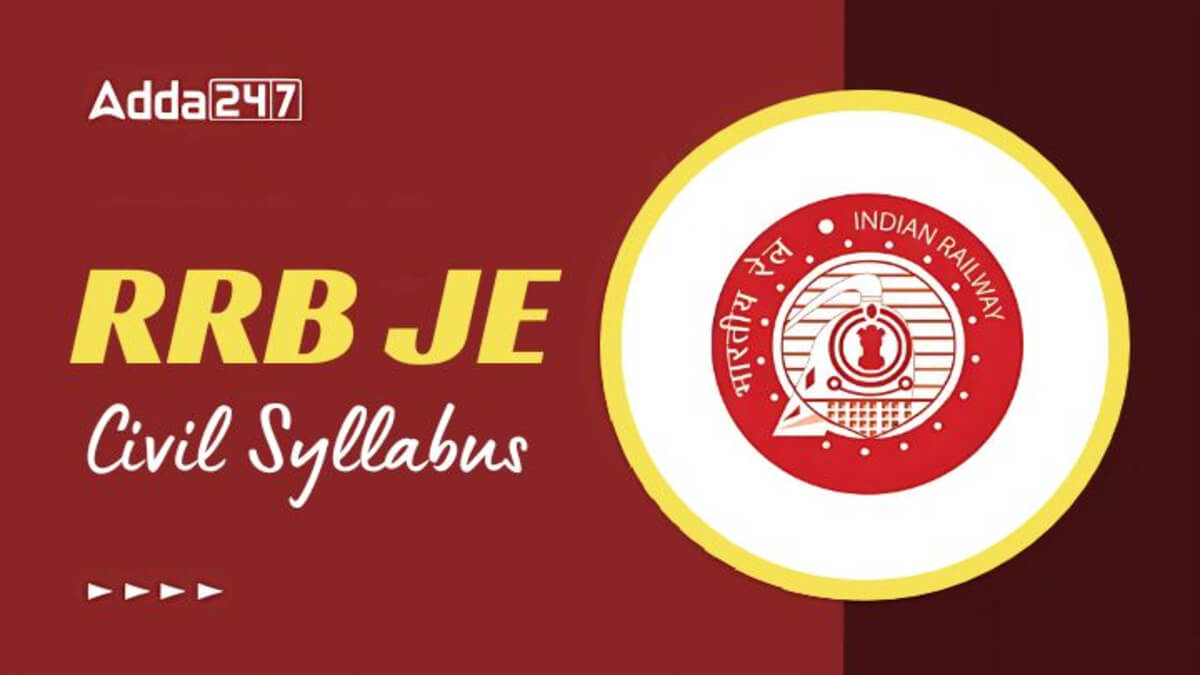
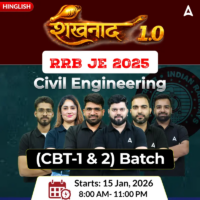

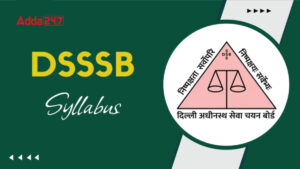 DSSSB AE Syllabus 2026 and Exam Pattern,...
DSSSB AE Syllabus 2026 and Exam Pattern,...
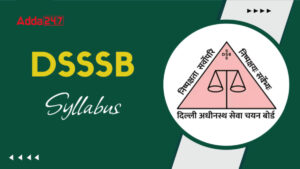 DSSSB JE Syllabus 2026 and New Exam Patt...
DSSSB JE Syllabus 2026 and New Exam Patt...
 HPPSC AE Syllabus 2026, Detailed Syllabu...
HPPSC AE Syllabus 2026, Detailed Syllabu...
